Stake UAE review 2026 for Emiratis & Expats
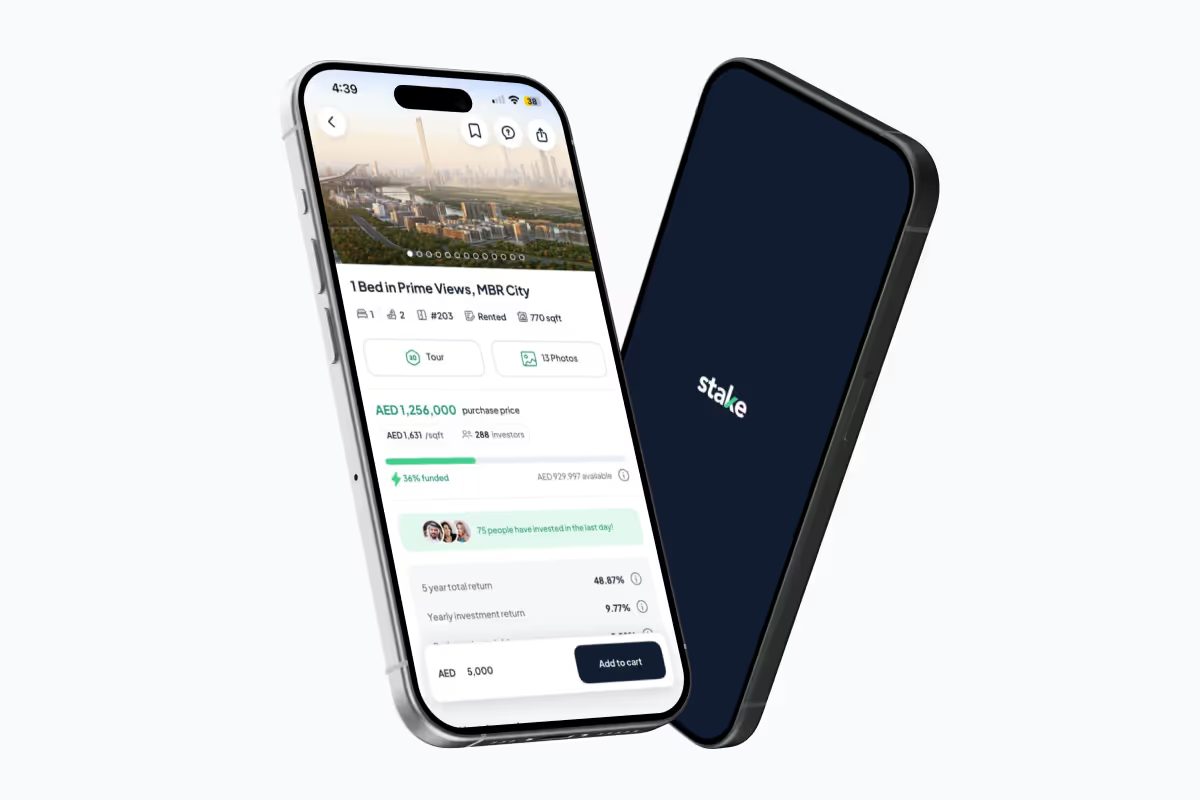
The UAE Residential Real Estate Market size was valued at around USD 36.32 billion in 2024 and is projected to reach USD 52.32 billion by 2030.
After seeing these numbers, it’s no surprise that investors are keen on investing in the UAE’s real estate; its tax-free policies, high rental yields, and stable regulatory environment make real estate not just attractive but also lucrative.
This review is about an app that lets you invest in the UAE’s real estate market - Stake. We cover what the app offers for Emiratis and Expats, fees, risks, pros, and cons.
Overview of the Stake UAE investment platform
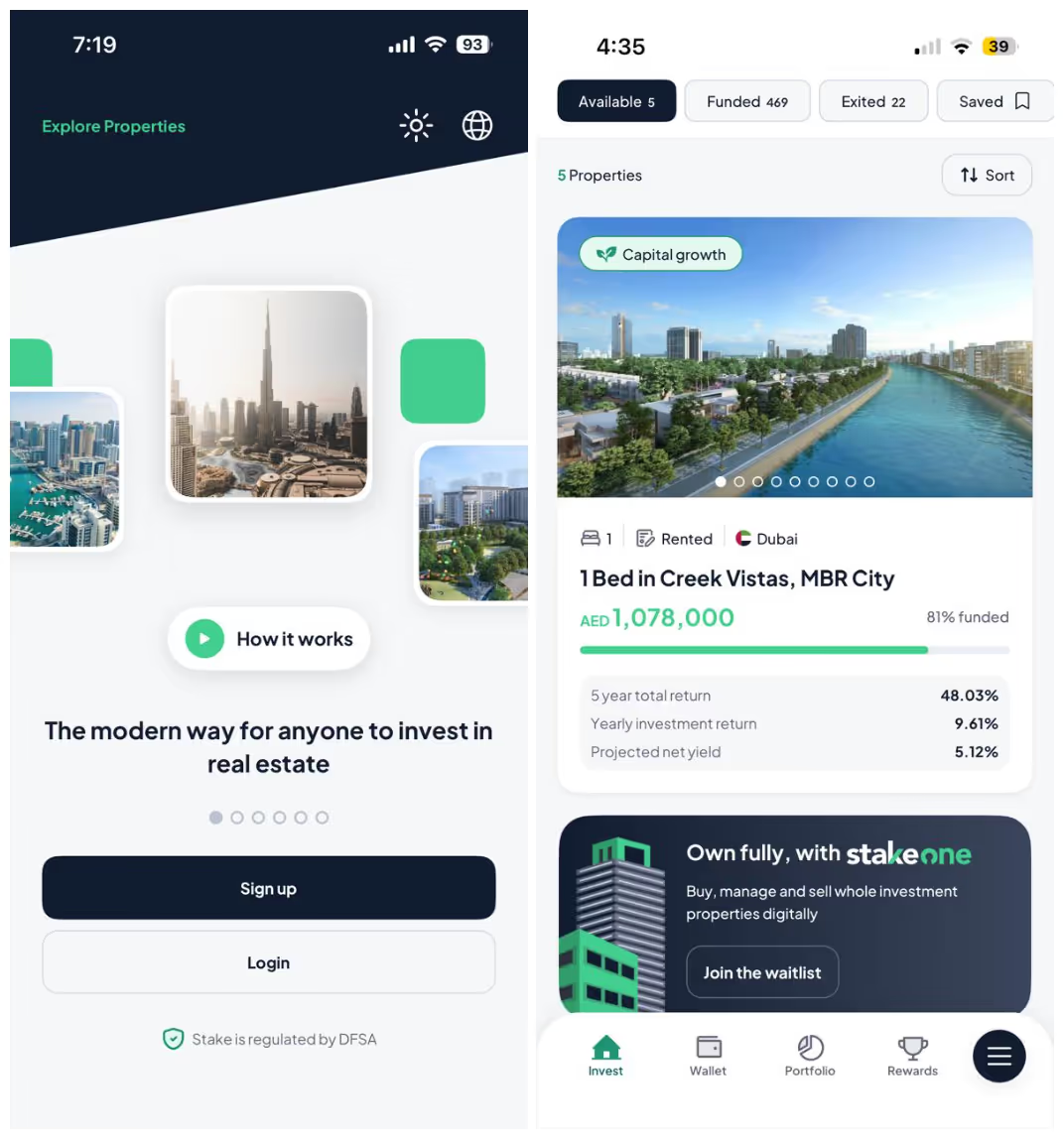
Stake was co-founded in Dubai in 2020 by a team with deep real estate experience. The platform officially launched in 2021 and has quickly grown into one of the UAE’s leading real estate crowdfunding apps.
It’s backed by major investors, including MEVP and Abu Dhabi’s Mubadala Fund, raising approximately $26 million to date.
Stake comes with an app that allows everyday investors to buy fractional shares of rental properties in Dubai. Investors earn a share of the monthly rent and a share of any capital appreciation when the property is sold.
It’s a hassle-free way to become a landlord for a small fraction of the cost of buying a whole property.
The platform operates from the Dubai International Financial Centre and is regulated by the Dubai Financial Services Authority (DFSA):
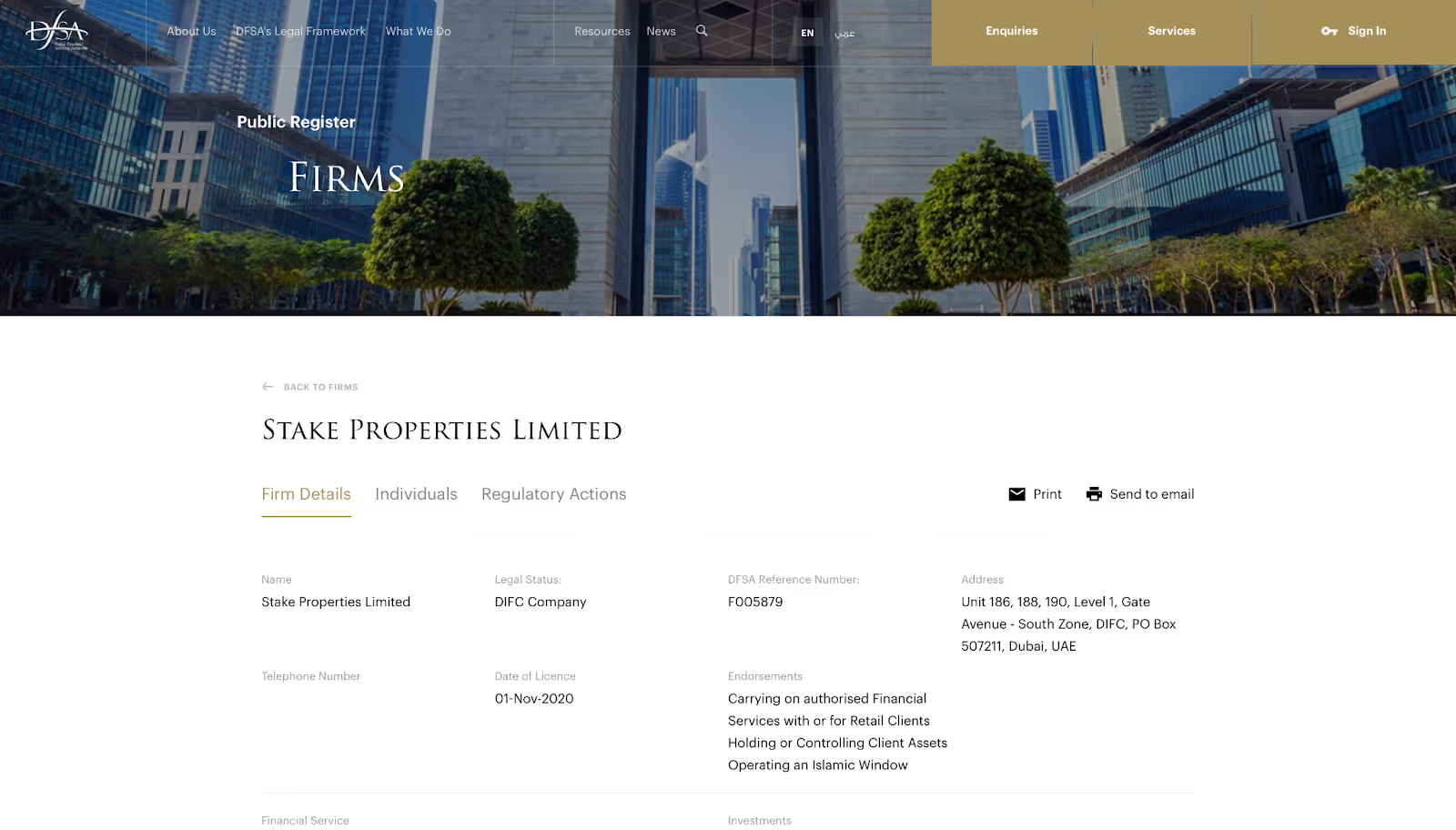
Since its launch, over AED 46.5 million in rental income has been paid out to more than a million investors, yielding a net return of ~5 to 6%.
Highlights
In a hurry? Below is a quick rundown of Stake’s key features and terms:
Stake UAE core features
Invest in high-income Dubai properties
Stake lets you buy fractional shares of Dubai apartments starting with as small an investment as AED 500.
You see each property’s target net yield, hold period, and tenancy status in-app.

Rent is collected and paid to your Stake wallet monthly, and Stake handles tenant and property management through the SPV structure.
Saudi real estate funds
Within the same app, you can invest in Saudi real estate funds regulated by the Saudi CMA. These funds are also structured to be Shariah-compliant, making them suitable for Muslim investors. They provide regional diversification beyond the UAE and typically pay distributions on a set schedule.
These Saudi funds can provide exposure to assets such as commercial buildings or development projects, which retail investors would otherwise have no way to invest in.
StakeOne (full-property digital ownership)
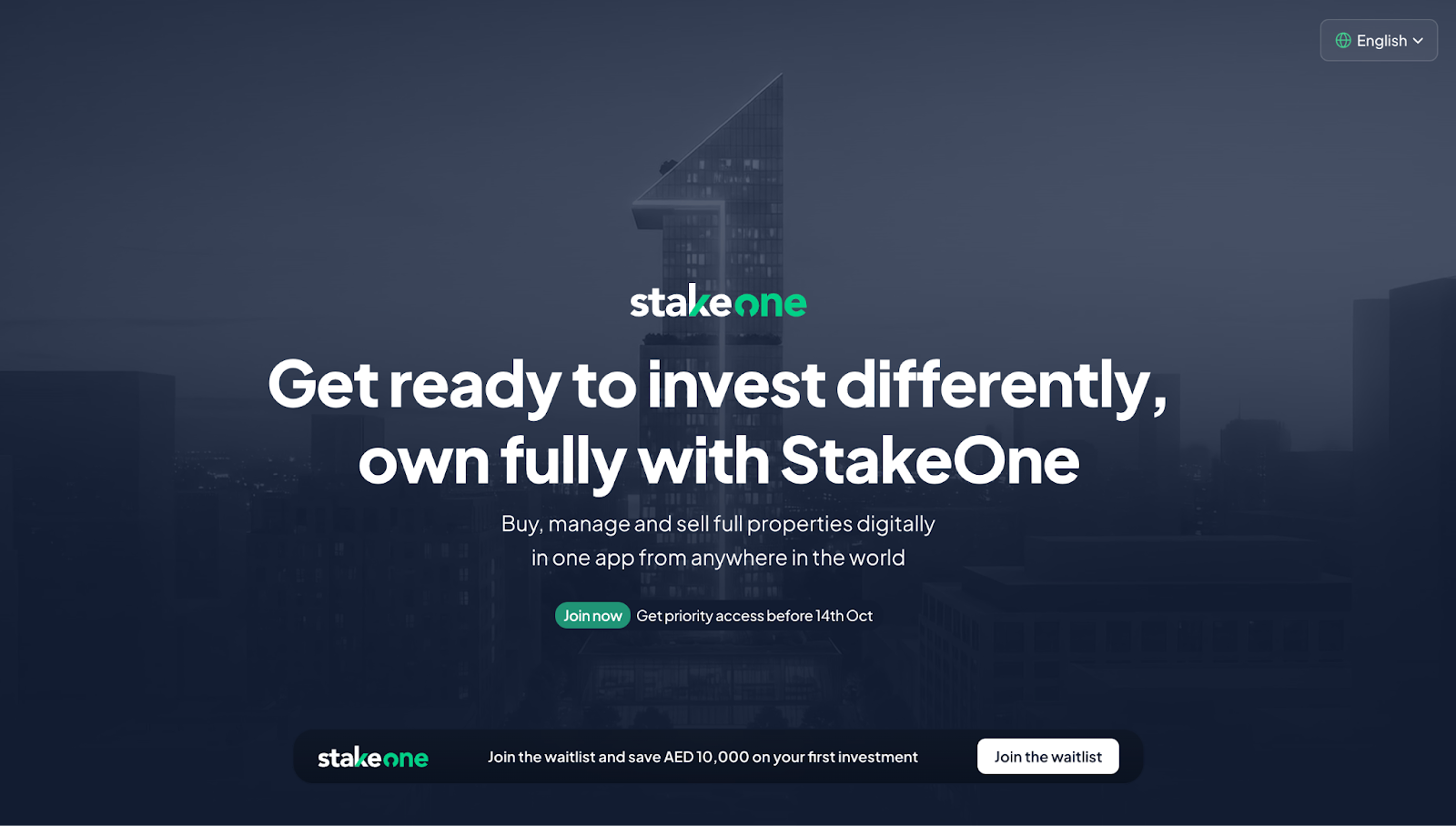
StakeOne is for buying an entire property end-to-end through the app. You browse a curated set of units, complete purchase and transfer digitally, and track rent and performance in one dashboard. Stake arranges leasing and management, and can handle the exit when you decide to sell.
Note: StakeOne will be launching on 14th October.
Tiers and rewards
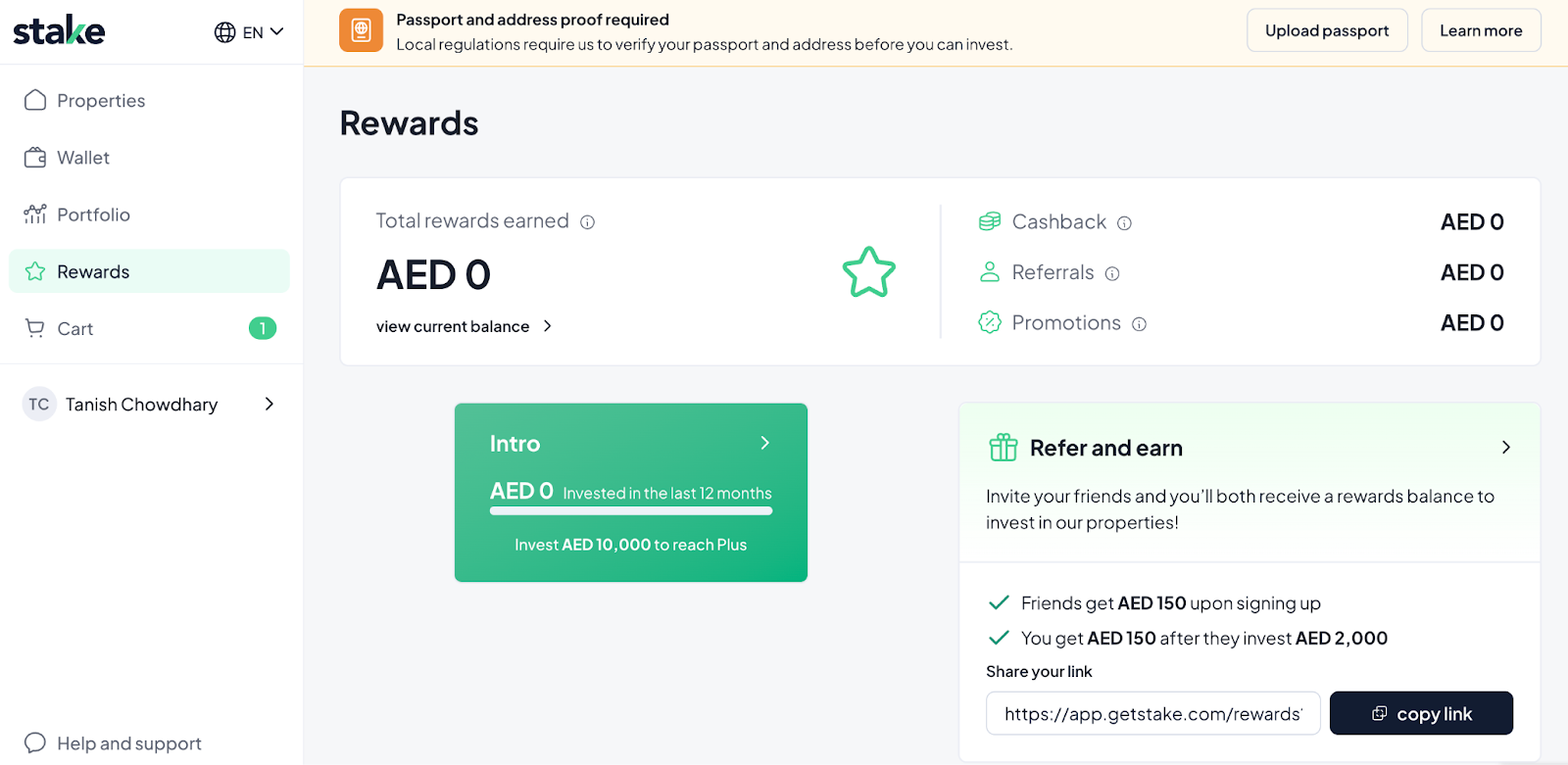
Stake Rewards offers cashback and perks based on your average investment level over the past 12 months. Cashback ranges from 1% at entry tiers up to 3% at Prestige, effectively offsetting part of the fees.
Here are the different tiers Stake offers:
- Intro: The base level for all new users, offering standard referral rewards.
- Plus: Unlocks access to automation tools like ‘Rent Reinvest,’ which automatically reinvests rental income, and provides boosted referral bonuses.
- Pro: Introduces cashback on new investments, a key perk for more active users.
- Elite: Provides early access to new property listings before they are available to lower tiers, along with enhanced cashback and referral bonuses.
- Prestige: The top tier, reserved for the platform's largest investors. Benefits include the highest cashback rates, a dedicated relationship manager, exclusive invitations to Stake events, and a complimentary Bloomberg subscription.
Private investments: The good and the bad
Before diving in, it's important to understand that fractional real estate investing is a type of private investment that offers several attractive benefits but also carries certain risks.
The good:
- Tangible asset exposure: You’re investing in a real Dubai apartment generating rent, which can serve as an inflation hedge.
- Low correlation with stock markets: Real estate prices don’t swing daily like equities, making the investment stable.
- Passive monthly rental income: Dividends are deposited regularly, creating a reliable passive income stream.
The bad:
- Illiquidity: Unlike stocks, you can’t quickly sell; funds are typically locked until the property sells, often for 3 to 5 years.
- Returns aren’t guaranteed: Vacancy, tenant issues, or market downturns can result in yields ranging from 0 to 4% in a given year.
- Fees eat into returns: Acquisition, administration, compliance, and exit/performance fees can consume 10-15% of returns over a complete cycle.
- Not principal-protected: Unlike bank deposits, your capital is at risk and could decline if property values fall.
With all these risks associated with real estate investing, we recommend that you only invest an amount you’re comfortable leaving untouched for years, and that you could afford to lose in a worst-case scenario.
Who is Stake for?
Stake is best suited for UAE investors who:
- Want exposure to Dubai real estate but can’t or prefer not to buy property outright.
- Have some spare investment capital and a long-term horizon.
- Want to diversify their passive income sources.
If you’re an expat renting in the UAE, or an overseas investor, Stake lets you dip into the local property market without needing AED 1 million+ or dealing with mortgages and brokers.
Pros and cons
Pros
- Low minimum and easy diversification: You can start with as little as AED 500, making it accessible for even first-time investors. This low entry point means you can spend a few thousand dirhams across multiple properties. It’s a simple way to build a mini real estate portfolio rather than saving for years to buy one apartment.
- Simple user experience: Stake’s app interface is clean with a low learning curve. This makes the entire process, from signing up and completing KYC to funding your account and browsing and investing, smooth.
- Monthly rental payouts: Unlike some investments that pay quarterly or annually, Stake distributes rental income every month into your account.
- Quality properties and pre-vetting: Stake focuses on premium Dubai neighborhoods and handles all property management. It handles finding tenants, collecting rent, maintenance, and other tasks via partners, so you can truly invest and forget.
- Dedicated support: Stake offers customer support (during UAE business hours) and assigns account representatives to larger investors. They also provide a lot of educational content (webinars, market insights) and in-app data to help investors make decisions.
Cons
- Illiquidity and exit friction: Once you invest, your money is stuck for a long time. Stake requires a minimum 12-month lock-in; you cannot attempt to sell for the first year. After that, you can only try to sell during limited exit windows (twice a year), and even then, a sale is not guaranteed if no one buys your stake.
- Multiple fees that add up: Stake’s fee structure, while transparent, is heavy. If you add up all the fees and commissions (we will get into the details in the next section), it can consume ~14 to 18% of the property’s value across the purchase and sale.
Stake fees and commissions
Stake’s fee structure is transparent but multi-layered. You pay a bit at every stage: when entering a deal, during the holding period, and upon exit.
Below is a breakdown of fees that Stake definitely charges (we excluded any purely optional or situational fees):
Here’s when and how the fees mentioned above are charged:
- Acquisition fee: At the time of funding the property. This is taken upfront from your funds when you invest in a property.
- Annual management fee: To the SPV for ongoing management, which effectively reduces the net rent distributed to the investors.
- Initial KYC/AML fee: Once at the time of investment. Covers compliance onboarding cost.
- Annual compliance fee: Annually starting one year after purchase, for ongoing regulatory compliance.
- Exit fee: When you sell your stake or when the property is sold, based on the sale price or your original investment (whichever is higher).
- Performance fee: Only if the property is sold for a gain above its original purchase price.
Funding your Stake account via bank transfer is free, and withdrawing your available cash is also free. However, funding via credit/debit card can incur ~2 to 2.5% processing fees (unless you’re in a reward tier where Stake rebates it).
You might ask, what about all the property purchase costs like the Dubai Land Department fee, broker fee, etc.? The investor bears those as part of the deal.
Stake typically includes them in the total funding target for the property.
For example, Dubai’s 4% transfer fee, trustee and registration fees, insurance, and valuation, among other costs, are added to the property price.
This means if a property’s market price is AED 1,000,000, Stake might raise ~AED 1,100,000 to cover the property plus all fees and its 1.5% cut.
All these upfront costs and fees can total roughly 15% above the property’s price, which is why your first couple of years of rental income essentially go into recuperating these fees.
Let us show you an example of how these fees impact an investment:
Suppose you invest AED 1,000 into a property and hold it for 5 years, during which it yields a steady rent and then sells at roughly the same price it was bought (no major appreciation):
In the above rough scenario, you’d put in AED 1,000 and get back about AED 1,125 (a AED 125 profit) after 5 years, which is roughly a 2.5% annualized return. That’s if the property value didn’t change.
If the property appreciated 15% over that period, your share would be worth 1,150; you’d pay a 2.5% exit on that (28.8) and a 7% performance fee on the 150 profit (10.5).
In that case, you’d get back around 1,150 – 28.8 – 10.5 + 221 rent = AED 1,332, which implies a ~6.6% annualized return.
The takeaway: fees can have a significant impact on your bottom line. With no appreciation, a lot of your rental yield goes towards fees (as a cost of convenience). With decent appreciation, you do better, but Stake will still claim a slice of the gains.
Always factor these in when evaluating the projected returns on a listing. Stake’s app does show expected net returns after fees; use those numbers and consider them realistically on the lower end of possibilities.
Liquidity: The real catch
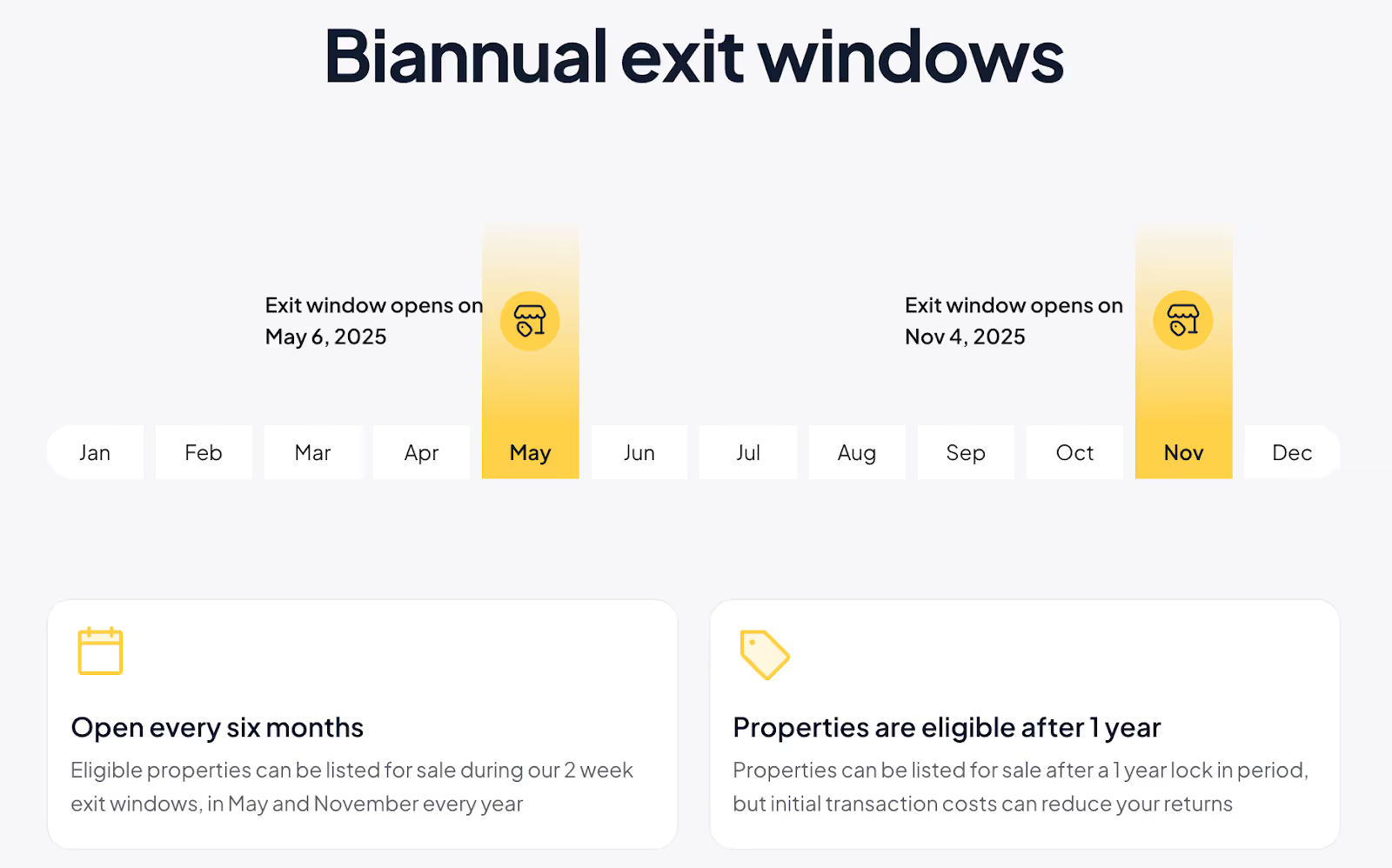
Liquidity is where Stake shows its biggest weakness. As mentioned earlier, after you buy shares, your money is locked for a period of 12 months. Only after that can you attempt to sell during bi-annual ‘Exit Windows’ in May and November.
These windows act as a small secondary market, but sales depend on other users buying your stake. What we have noticed is that demand has been limited, and many investors only find buyers by offering discounts.
Even if you manage to sell, transfers can take 6 to 8 weeks to settle as ownership records are updated in the DIFC and DLD. Therefore, expect to remain invested until the property itself is sold, typically after three to five years.
Stake has signaled plans for a more continuous trading marketplace; however, liquidity remains uncertain until then.
The lesson is simple: treat Stake as a long-term commitment, or as “play money”. Only invest amounts you can leave untouched for years, and rely on other assets like stocks, ETFs, savings accounts, or cryptocurrencies for short-term needs.
How secure and compliant is Stake?
Stake is regulated by the Dubai Financial Services Authority (DFSA) under a license for property investment crowdfunding. This ensures governance, audits, investor protection caps, and clear separation between client assets and company funds.
DFSA imposes investor protection rules, like the investment limits for retail investors, to prevent people from over-extending:
- Pre-property limit: AED 183,650 per property
- Annual limit: AED 367,000 per year
Each property is held in a dedicated SPV (Special Purpose Vehicle) registered in DIFC. The SPV is basically a company whose only asset is that property. Investors receive shares in that SPV, which legally owns the property.
If Stake as a company fails, creditors cannot claim these assets; your stake in the property remains intact.
When you invest via Stake, you receive formal documentation, including a share certificate of the SPV and a copy of the title deed, which establishes a legal claim to the property through the SPV shares.
The platform is also authorised to offer Shariah-compliant investments, and its Saudi funds are structured accordingly.
Stake’s founders, Rami Tabbara, Manar Mahmassani, and Ricardo Brizido, come from real estate and banking backgrounds, and the company is backed by large investors, including Mubadala and Aramco’s Wa’ed Ventures, which adds credibility.
Overall, Stake’s DFSA license, SPV structure, and strong backers make it one of the safer regulated options in UAE real estate fintech. Market risks remain, but your ownership rights are legally protected.
From a security and compliance perspective, Stake checks a lot of boxes:
- Regulated by DFSA
- Segregated asset structure
- No debt on assets
- Strong backers and a credible team
- Caps on investments
Stake UAE visa programs
One of Stake’s standout features is its integration with UAE residency programs. By investing through Stake, you can qualify for long-term visas without having to handle the usual property paperwork.
Golden visa (10 years)
- Minimum investment: AED 2,000,000
- How it works: Stake spreads your 2 million across multiple prime properties, helping you diversify while still qualifying.
- Benefits: 10-year renewable residency, family sponsorship, and monthly rental income on your portfolio.
- Advantage: Fees are streamlined compared to buying a single AED 2 million unit, making entry more efficient.
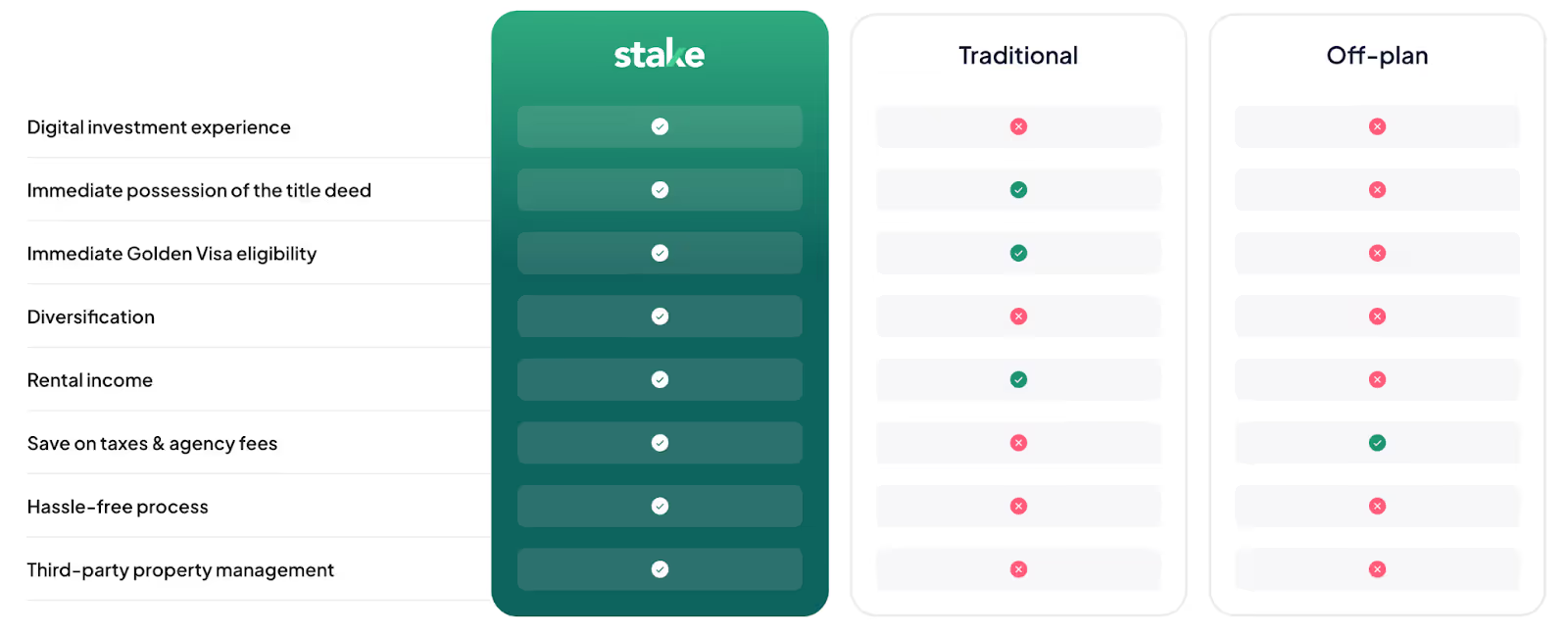
Retirement visa (5 years)
- Minimum investment: AED 1,000,000
- Age requirement: 55+
- How it works: Invest 1M through Stake’s properties or funds; Stake manages the process with DIFC.
- Benefits: 5-year renewable residency, family sponsorship, passive rental income during retirement.
- Extra perk: Cashback of ~2% on qualifying investments.
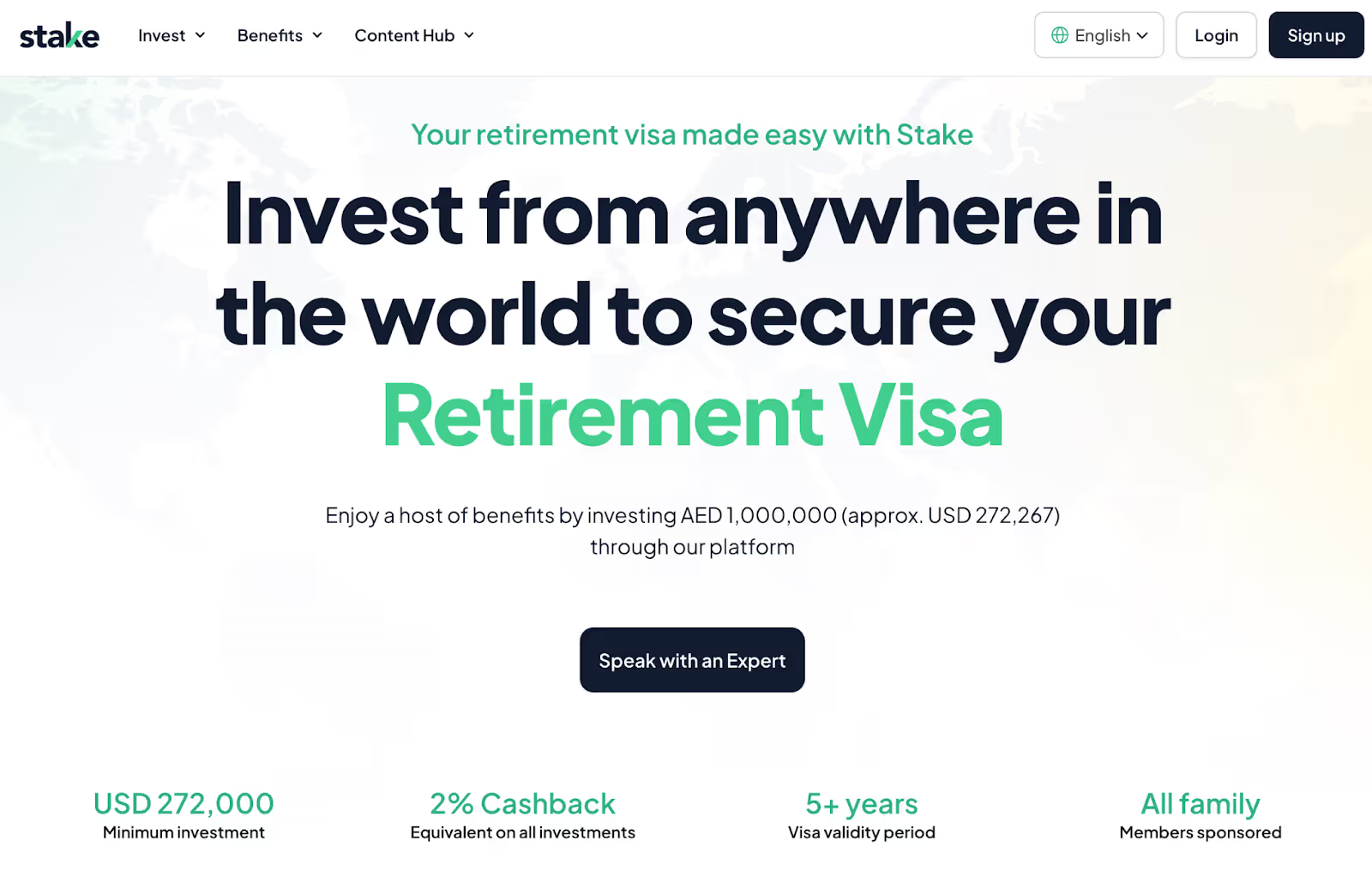
Stake UAE vs Alternatives
Stake has two main competitors in the UAE real estate investment space:
- SmartCrowd: SmartCrowd is a Dubai-based fractional property investment platform similar to Stake. You can invest from as low as AED 500 in curated Dubai properties and receive monthly rental income.
- Prypco Blocks: Prypco Blocks is a newer player offering fractional real estate investment in the UAE and GCC markets. Its model emphasizes block-based tokenization; essentially dividing properties into tradable ‘blocks’ (like digital shares) to increase liquidity.
While the core concept and functionality of all three platforms remain the same, fees and commissions are where they slightly vary.
And of course, you could skip fintechs entirely: UAE REITs (like Emirates REIT) or global REIT ETFs give you real estate exposure with far better liquidity, even if the experience feels less exciting than “owning part of a Dubai flat.”.
Is Stake UAE worth it?
Stake introduced fractional real estate investing to a wider audience in the UAE, lowering entry barriers with investments starting at AED 500 and offering monthly rental payouts. Its DFSA license, SPV structure, and strong institutional backers give investors confidence in the platform’s compliance and security.
That said, the biggest drawback remains liquidity. Once you commit funds to Stake, you have to be prepared to stay invested for years, as secondary exits are uncertain. Add to that the multi-layered fees, and returns can be lower than advertised unless property values appreciate meaningfully.
For that reason, we recommend Stake for fun money and diversification, and for people comfortable with capital lock-ups; it’s not ideal for anyone needing liquidity or expecting equity-like returns.
Stake is for you if you’re a long-term investor, looking for exposure to Dubai real estate without buying an entire property. It’s not ideal if you’re seeking quick access to money and guaranteed returns.
Do your own research: explore the GetStake website, analyze performance on their investor reports, and decide for yourself. Start small and adjust over time.
Don’t agree? Send us your feedback!
Read other investment guides:



